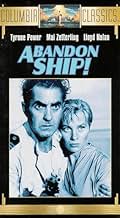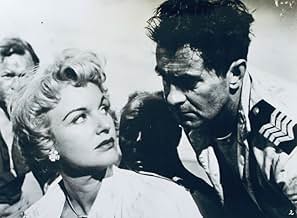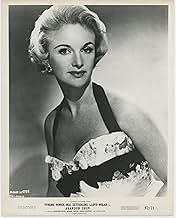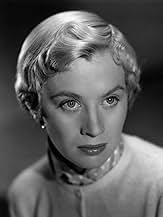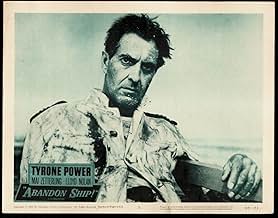IMDb RATING
7.5/10
2.1K
YOUR RATING
A ship's officer finds himself in command of a lifeboat full of survivors of a sunken luxury liner.A ship's officer finds himself in command of a lifeboat full of survivors of a sunken luxury liner.A ship's officer finds himself in command of a lifeboat full of survivors of a sunken luxury liner.
- Director
- Writer
- All cast & crew
- Production, box office & more at IMDbPro
Featured reviews
As gripping and powerful as it is, ABANDON SHIP! is a survival story that's hard to view from the comfort of an armchair or theater seat. The viewer can identify so completely with the daunting task facing the ship's officer (TYRONE POWER) when making life and death decisions with regard to how many people can use the lifeboat when a sunken ship leaves them adrift at sea.
True, there are a few stereotypes among the raft's passengers, but the drama becomes real and forceful due to the strong performances from an excellent cast. MAI ZETTERLING is fine as a nurse with a romantic relationship to Executive Officer Power and STEPHEN BOYD and LLOYD NOLAN are fine as other ship officers caught up in unusual circumstances surrounding their survival at sea.
Not for the squeamish, it has echoes of Hitchcock's LIFEBOAT (but without the humor).
Tyrone Power was at a stage in his career when he wanted more serious roles rather than stay forever fixed in the minds of movie-goers as a swashbuckling star. Here he certainly had his chance to prove his acting skills and he does a splendid job in a grim role, one of his last parts before his premature death from a heart attack at age 45.
True, there are a few stereotypes among the raft's passengers, but the drama becomes real and forceful due to the strong performances from an excellent cast. MAI ZETTERLING is fine as a nurse with a romantic relationship to Executive Officer Power and STEPHEN BOYD and LLOYD NOLAN are fine as other ship officers caught up in unusual circumstances surrounding their survival at sea.
Not for the squeamish, it has echoes of Hitchcock's LIFEBOAT (but without the humor).
Tyrone Power was at a stage in his career when he wanted more serious roles rather than stay forever fixed in the minds of movie-goers as a swashbuckling star. Here he certainly had his chance to prove his acting skills and he does a splendid job in a grim role, one of his last parts before his premature death from a heart attack at age 45.
Once seen, never forgotten. Very few films have ever moved into Hitchcock's territory and beaten him, but Seven Waves Away / Abandon Ship is one: ultimately it's a much superior film to Hitchcock's similar Lifeboat. Seven Waves Away was made with impressive conviction and passion by writer-director Richard Sale, who was very active in the 1950s but didn't get another opportunity to direct a feature after this one, despite living 36 more years (what's up with that?). Working with production designer Wilfred Shingleton and art director Raymond Simm and filming almost entirely in a large tank (except perhaps for a few long shots), Sale created an unforgettably immediate atmosphere for a completely harrowing and uncompromising tale of survival at sea under the worst imaginable physical and ethical circumstances.
The cast performed admirably under very trying circumstances (imagine being wet all day, every day); in fact, the miseries of the filming process influenced the acting in a quasi-documentary manner that benefits the picture enormously. Even seen on television, Seven Waves Away is an intensely experiential movie; I can only imagine what it felt like on the large screen.
This was practically Tyrone Power's last hurrah; in his early forties when the movie was filmed, he died of a heart attack on a project shortly thereafter (as his actor-father Tyrone Power Sr. had before him). Power acts with tremendous force and tension as the "captain" here; the dramatic arc of the story is contained entirely within his decision-making process, and for a first-time viewer his key decision (which I will not reveal) will always register as startling because it runs so counter-intuitively to our received sense of ethics. But that is part of what gives Seven Waves Away its wallop.
The cast performed admirably under very trying circumstances (imagine being wet all day, every day); in fact, the miseries of the filming process influenced the acting in a quasi-documentary manner that benefits the picture enormously. Even seen on television, Seven Waves Away is an intensely experiential movie; I can only imagine what it felt like on the large screen.
This was practically Tyrone Power's last hurrah; in his early forties when the movie was filmed, he died of a heart attack on a project shortly thereafter (as his actor-father Tyrone Power Sr. had before him). Power acts with tremendous force and tension as the "captain" here; the dramatic arc of the story is contained entirely within his decision-making process, and for a first-time viewer his key decision (which I will not reveal) will always register as startling because it runs so counter-intuitively to our received sense of ethics. But that is part of what gives Seven Waves Away its wallop.
Abandon Ship/Seven Waves Away is a very powerful and difficult film to watch, made a little more palatable by the presence of one of film's great matinée idols, Tyrone Power.
I'm sorry one of the posters didn't find him sexy. That man oozed sex from every pore of his body - just ask anyone who came within two feet of him, including his costar in this film, Mai Zetterling. Their torrid affair is discussed in vivid, oh so vivid detail in her autobiography - a whole 18-page chapter.
Sex aside, this film comes off as a great deal grittier than Lifeboat. For me, Tallulah Bankhead was so dazzling in Lifeboat, much of the focus was on her, which somehow dissipated a lot of the tragedy.
The two films are similar, though, on some plot points. However, due to Bankhead, there was some humor in Lifeboat. Abandon Ship/Seven Waves Away has none.
The film will keep you glued to your seat, but it is not easy to take, as it is unrelenting in its message and harrowing scenes. You will suffer along with each person who is sacrificed so that others may live.
It's great to see Tyrone Power in a meatier role, and I do believe his career would have taken some exciting turns, both on stage and screen, had he lived past the age of 44. His face was a total curse (to him only) and got in the way of serious acting pursuits for years.
His performance in Abandon Ship is excellent and stands as one of his best. There are other films where he had a tendency to tighten up, but this wasn't one of them.
It's a shame about him - like so many men of that era, he always had a cigarette in his hand; in Power's case, it was suspected he had heart trouble, but he was in denial about it and didn't want it verified. So we're stuck with what work of his we have, and a lot of it is pretty darn good.
** According to Mai Zetterling's book, All Those Tomorrows, the cast sat in a boat floating in a large indoor tank at Shepperton Studios. There were wind and wave machines and a watershoot pouring cold water on the cast. A starting pistol had to be used to start action as there was no way to hear the director. In the end, the whole film was dubbed because no one could hear.
I'm sorry one of the posters didn't find him sexy. That man oozed sex from every pore of his body - just ask anyone who came within two feet of him, including his costar in this film, Mai Zetterling. Their torrid affair is discussed in vivid, oh so vivid detail in her autobiography - a whole 18-page chapter.
Sex aside, this film comes off as a great deal grittier than Lifeboat. For me, Tallulah Bankhead was so dazzling in Lifeboat, much of the focus was on her, which somehow dissipated a lot of the tragedy.
The two films are similar, though, on some plot points. However, due to Bankhead, there was some humor in Lifeboat. Abandon Ship/Seven Waves Away has none.
The film will keep you glued to your seat, but it is not easy to take, as it is unrelenting in its message and harrowing scenes. You will suffer along with each person who is sacrificed so that others may live.
It's great to see Tyrone Power in a meatier role, and I do believe his career would have taken some exciting turns, both on stage and screen, had he lived past the age of 44. His face was a total curse (to him only) and got in the way of serious acting pursuits for years.
His performance in Abandon Ship is excellent and stands as one of his best. There are other films where he had a tendency to tighten up, but this wasn't one of them.
It's a shame about him - like so many men of that era, he always had a cigarette in his hand; in Power's case, it was suspected he had heart trouble, but he was in denial about it and didn't want it verified. So we're stuck with what work of his we have, and a lot of it is pretty darn good.
** According to Mai Zetterling's book, All Those Tomorrows, the cast sat in a boat floating in a large indoor tank at Shepperton Studios. There were wind and wave machines and a watershoot pouring cold water on the cast. A starting pistol had to be used to start action as there was no way to hear the director. In the end, the whole film was dubbed because no one could hear.
AKA Abandon Ship! A luxury cruise liner hits a mine and sinks in the shark infested south Atlantic. Survivors gather around an overcrowded lifeboat. Alec Holmes (Tyrone Power) takes command after the captain's death. With dwindling supplies and rescue unlikely, he faces an impossible choice with greater and greater urgency.
They probably filmed most of this in a giant water tank but it looks like it's the open ocean. The boat always looks dangerously close to sinking and the waters get really rough. This is actually a very harrowing tale. The high stress situation is great for pulling out the characters. There is something basic about their predicament. It is primal. The story is very compelling.
They probably filmed most of this in a giant water tank but it looks like it's the open ocean. The boat always looks dangerously close to sinking and the waters get really rough. This is actually a very harrowing tale. The high stress situation is great for pulling out the characters. There is something basic about their predicament. It is primal. The story is very compelling.
Even though I thought this film lacked qualities about the true event, I do acknowledge that Tyrone Powers was an actor with an abundant of talent. His ability to capture the viewer and hold the suspense is the reason that this movie is so well enjoyed by many.
The movie's, one and only, set is a small boat on the ocean. This happens as we are told a ship hits an old sea-mine and breaks the keel. Thus, making the ship sinks in minutes with few people surviving. We are not privy to see how the ship sank nor how the characters get into the water as the film begins after the sinking. The first bit of dialog starts as characters are already clinging to floating wreckage.
The rest of the movie all happens in the ocean. Here, Alec Holmes (Powers), will be in charge of a small boat that has way too many people aboard. Holmes makes the decision that some have to go-- and this brings us to the plot of the story.
The entire movie hinges on Power's ability to hold the audience's attention for nearly 90 minutes. Tyrone Powers accomplishes this task by giving a powerful performance. The only drawback of the movie are some of the small scenes that were overplayed for dramatic effect. It happens right at the beginning as two survivors cope with the sinking and lost of love ones. Another is when the radio operator tells that he never sent out a SOS message - and then near the end when one person wants to drown but is saved by others. Otherwise an enjoyable film to watch.
The movie's, one and only, set is a small boat on the ocean. This happens as we are told a ship hits an old sea-mine and breaks the keel. Thus, making the ship sinks in minutes with few people surviving. We are not privy to see how the ship sank nor how the characters get into the water as the film begins after the sinking. The first bit of dialog starts as characters are already clinging to floating wreckage.
The rest of the movie all happens in the ocean. Here, Alec Holmes (Powers), will be in charge of a small boat that has way too many people aboard. Holmes makes the decision that some have to go-- and this brings us to the plot of the story.
The entire movie hinges on Power's ability to hold the audience's attention for nearly 90 minutes. Tyrone Powers accomplishes this task by giving a powerful performance. The only drawback of the movie are some of the small scenes that were overplayed for dramatic effect. It happens right at the beginning as two survivors cope with the sinking and lost of love ones. Another is when the radio operator tells that he never sent out a SOS message - and then near the end when one person wants to drown but is saved by others. Otherwise an enjoyable film to watch.
Did you know
- TriviaThis movie is based on the real event of the William Brown, an American ship that sank in 1841, taking with her 31 passengers. A further 16 passengers were forced out of an overloaded lifeboat before the survivors were rescued. The survivors were picked up by the American ship Crescent, the same name of the liner that sinks in this movie.
- GoofsThe boat used in long shots and the one in close-ups are obviously different.
- Quotes
Announcer: [closing lines] The story which you have just seen is a true one. In real life Captain Alexander Holmes was brought to trial on a charge of murder. He was convicted and given the minimum sentence of six months because of the unusual circumstances surrounding the incident. If you had been a member of the jury, how would you have voted: guilty or innocent?
- ConnectionsRemade as The Last Survivors (1975)
Details
- Release date
- Countries of origin
- Language
- Also known as
- El mar no perdona
- Filming locations
- Shepperton Studios, Shepperton, Surrey, England, UK(Gus Angus worked as Third Assistant Director and confirmed the film was shot on H Stage also known as the Silent Stage at Shepperton.)
- Production company
- See more company credits at IMDbPro
- Runtime1 hour 40 minutes
- Color
- Aspect ratio
- 1.85 : 1
Contribute to this page
Suggest an edit or add missing content

Top Gap
By what name was Pour que les autres vivent (1957) officially released in India in English?
Answer
